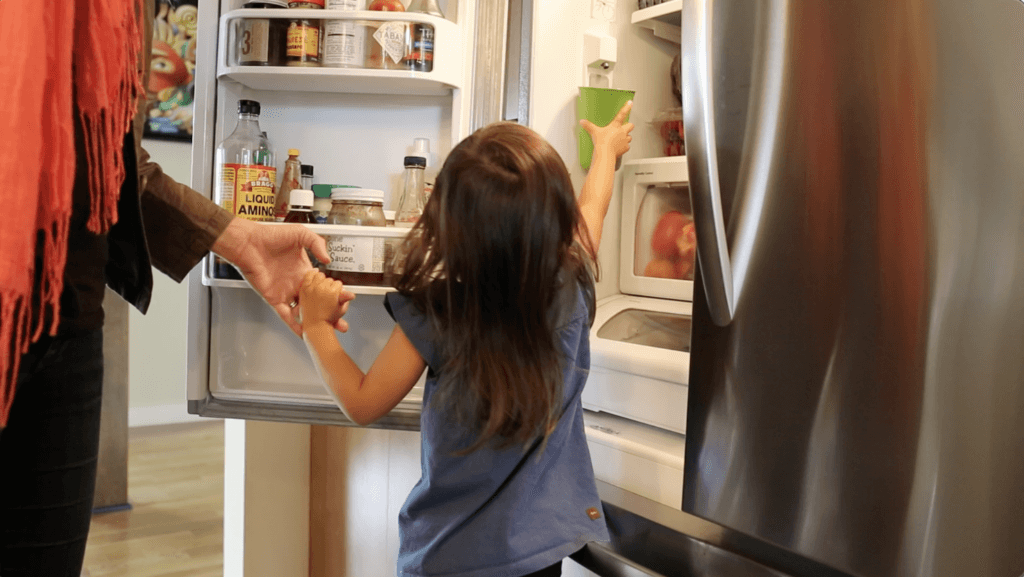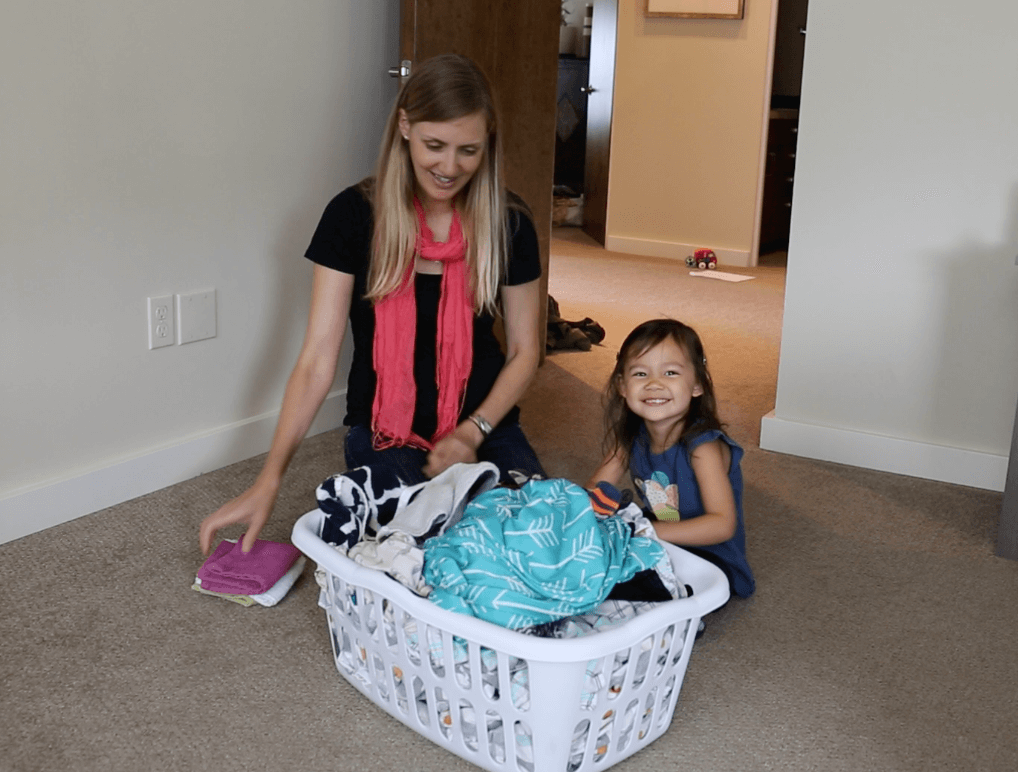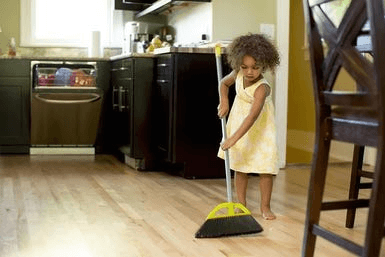Why I teach my nanny kids how to do things for themselves

In Positive Discipline, we always come back to what life skills you’d like to see the children you care for have when they are adults. People often list that they’d like the children in their life to grow up to be problem-solvers, self-advocative, effective leaders, self-reliant, etc. So, how do we, as nannies, support that?
Take Time for Training & Explicitly Teach Skills
If we want our nanny charges to learn life skills, we start by explicitly teaching those skills. Nobody just knows how to do laundry or scramble an egg – even basic life skills need to be taught clearly and explicitly with step-by-step training. Typically, the best way to do this is to model and narrate, then move into doing the task together, then the child does it while you supervise, and eventually the child is ready to do that task on their own. Think about making your bed, it seems pretty simple, right? Well, maybe not once you start thinking about pulling up and straightening your flat sheet (especially if you’re small and can’t easily reach across the bed!), getting your blankets, comforters, or duvets on the bed nicely, arranging your pillows and stuffed animals just so – there’s actually a fair amount of steps going on there. If you ask a child to do a task without taking time for training, you’re setting both of you up for frustration.
Families love it when they see their children starting to do tasks around the house that you’ve taught them! This is a huge nanny bonus. Young children are so capable and can absolutely pack their own lunch, do their own laundry, make their own beds, and do so much more if they have the training. It knocks parents’ socks off when you’re the one teaching them!
One of my favorite parts of Positive Discipline is the premise that mistakes are opportunities for learning. If you see a child making a mistake, especially if it’s one of these practical life-skills or tasks you’ve been teaching, then respond with kindness and explore that through curiosity. Are they missing a step or a skill? If so, go back and review. Break tasks down into even smaller steps. I’ve shared before that I always announce when I make a mistake at work and model for my nanny kiddos that mistakes are no big deal and just something we try to fix and grow from. Mistakes are giving you insight and clues into what skills are missing so you can go back and fill in any gaps, setting everyone up for success the next time.
Jobs & Contributions
Jane Nelsen reminds us that “children learn life skills, develop social interest, and feel capable by helping out at home.” Sproutable has a fabulous hand-out that lists appropriate contributions for children under five. Having your nanny kiddos have jobs around the house is a two-fold win because they’re learning those life skills which in turn boosts their self-esteem, and it’s literally less work for you to do! Kiddos need a lot of training, support, and encouragement when they pick up a new job or contribution around the house, but it’s so worth the time you front load when they are capable of packing their own lunch & backpack before school on a busy morning or when you have an extra set of hands helping you to prepare dinner in the evening. Genuinely asking a child for their help gives them the vital sense of significance and belonging that every human needs. On that note, partner with the family you work for and consider implementing a job wheel to get everyone contributing!
Let Go & Show Faith
Personally, “letting go” is one of the more challenging Positive Discipline ideas for me, so I have to be intentional about it by reminding myself of the benefits that come from letting go. In this context, letting go simply means stepping back after you’ve taken the time for training and have faith that your child will learn. Jane Nelsen says, “Letting go does not mean abandoning your child. It means allowing your child to learn responsibility and feel capable.” We want our nanny charges to be capable and responsible! I think there’s a bit of a dichotomy here, where as a paid childcare worker, it’s natural that we want to help our nanny kiddos and “earn” our check by being super helpful (on top of that, little kiddos are so small & cute, we just want to do things for them!), but on the other hand, when we do too much, we rob the children of opportunities to learn and grow. This is a time to remind yourself of those long-term goals & life skills we are invested in. We are their teachers as well, not just helpers.
After you’ve taken the time for training, we must step back and show faith. Jane Nelsen explains that “children develop their problem-solving skills and disappointment muscles through experiences.” Of course there are times we step in (safety issues, skills they haven’t learned yet), but there are also times that we can let go. Examples of this could be only offering one reminder to grab that library book is due, and then letting the child face the natural consequence of not checking out a new one if they forget. It’s not your library book, it’s not your responsibility to remember it, but it is a learning experience that may help them remember it the next week. Another example could be not worrying about it when you notice an older child hasn’t done their laundry and won’t have a clean uniform for soccer that weekend. It’s a learning experience! Nobody is going to be hurt, and they’ll be fine wearing a dirty or mismatched uniform one weekend. Often we notice things faster than children and are quick to offer a reminder without giving them the autonomy to think for themselves. I don’t ever intend to be cold or unhelpful when I see a child who is about to learn a lesson or face a natural consequence, but jumping in and rescuing every time is also unhelpful. We can still be kind, empathetic, and validate their feelings while they learn those lessons and build up their resiliency.

Teach Kids to Ask for Help
If my nanny charge were to tell me, “Brr! I’m cold,” I might reply by saying, “Oh, you’re cold. Are you telling me that or are you asking if we can go inside and get a coat?” Sometimes they are just sharing a thought with me, but other times they are trying to solve a problem. In that case, I just quickly and casually give that script/reminder of what that sounds like – “You could say, can we go inside and put coats on?” It may sound like semantics, but it’s very important to me that my nanny kiddos know exactly what it sounds like to ask someone when they need something and how to speak assertively. I come from a background in classroom teaching, and it’s extremely important that a child has the confidence and vocabulary to clearly ask for help when they need it. If there’s one teacher to twenty (even thirty) kiddos in a classroom- even an amazing teacher is going to miss things, and kiddos need to be self-advocating enough to ask for something when they need it. Similar examples could be having children order for themselves at a restaurant or talking to their teacher themselves when there’s an issue in their classroom. Practice what that will sound like with them beforehand so they feel confident when it’s their turn, and always include them in brain-storming solutions when they do have a problem they’re trying to solve.
I often have to stop myself, but I consciously try not to jump in and rescue my nanny kids when I see them struggling with something. So often it’s just small things like opening a glue bottle, getting their coat on, or looking for a missing sock. There’s two reasons for this: first, like I said, I want my nanny kids to practice asking for help, but I also want them to have the self-confidence and pride that comes with solving their own problems. Of course I can open the glue bottle for them, but how will they learn how to do it themselves if I’m always grabbing it and doing it for them? Are you empowering or enabling a child when you jump in to rescue? I already know how to open a glue bottle, and they’re the ones who need the practice, so why would I do it for them? It can be tough to watch them struggle to do something, but remember that they are learning in that moment, and then watch their face light up when they do it for themselves!
Sometimes a child will ask for help with something you know they know how to do. I used to care for a child who knew how to buckle their car seat buckles but would often ask me to do it for them. About 95% of the time I’d say something like, “I know you can do it! I’ve seen you do it lots of times! Use your strong arms to get those clicked in!” But, I will admit, that every once in a while, if I know it’s been a tough day, if they’re tired or not feeling well, then I will go ahead and help a kiddo with something I know they can do. I don’t think this is pampering, but if you read the room and can see it’s not really about the buckle that day, it’s about needing a little extra TLC or a little extra connection, then go ahead and help – just not every time! It’s all about progress, not perfection. It’s up to you, knowing your nanny children, remembering your long-term goals & values, and establishing your non-negotiables to decide when it’s time to follow-through and when it’s okay to budge a little bit. If you find yourself flexing too often, that can lead to more back-and-forth and a step backwards on those goals. It’s nuanced, for sure.
Those are some ways that I try to teach my nanny kiddos to be independent, self-advocating, problem-solvers. As nannies, we might not get to see all of these skills pay-off when they reach adulthood, but we know that they will.
How do you foster those skills in your nanny children?





Comments